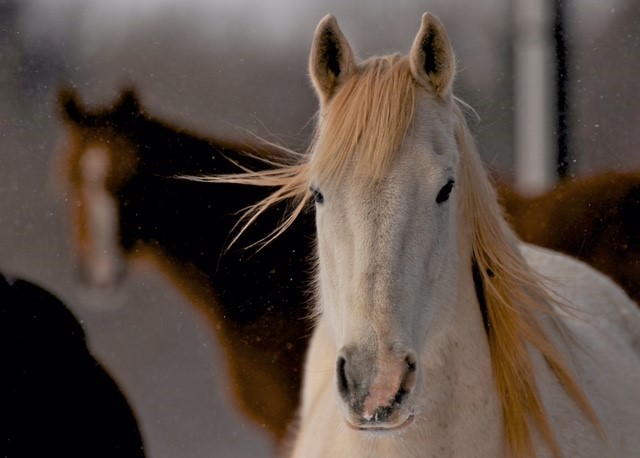
Agricultural News
Nutritional Needs of Older Horses May Require a Change in Owners' on Farm Management Practices
Thu, 21 Dec 2017 17:09:23 CST
 We are what we eat, goes the old cliché, and the saying is as true for horses as for people, especially as the years pile up.
We are what we eat, goes the old cliché, and the saying is as true for horses as for people, especially as the years pile up.
"Aging may necessitate making changes to the feeding programs of older horses in consideration of nutrient content, degree of processing and the amount fed," said Kris Hiney, Oklahoma State University Cooperative Extension equine specialist.
One obvious aspect is the fact an older horse's aging teeth may limit the equine's ability to chew thoroughly or greatly increase the amount of time it takes to consume feed.
"Due to the root structure of a horse's teeth, the weakening of tooth attachment with age can result in loose teeth or even loss of teeth, which may make chewing difficult or uncomfortable," Hiney said. "People who have experienced a similar challenge due to increasing years should be able to sympathize."
As with people, teeth problems can contribute to weight loss, along with a lessening ability to absorb nutrients that were previously available simply through eating. In addition, an older horse's poor chewing ability may make the animal more prone to choking or impaction colic.
OSU animal scientists and equine veterinarians recommend regular dental inspections as frequently as every six months should be performed relative to older horses.
"While a reduction in diversity of gut microbiota in elderly horses has been reported, the effect remains to be seen," Hiney said. "Likewise, there is no confirmed evidence of reduction in digestibility as yet. Therefore, feeding high-quality feeds that can be more easily chewed is a horse owner's most viable option in ensuring good nutrition with older horses."
Many feeds designed for older horses include more processed feeds and alternative feed sources that may be easier to digest. These feeds typically will have a higher protein percentage - around 12 percent to 14 percent - and should provide the appropriate amino acids.
"Higher calorie concentration in the form of fat is preferred, as many older horses have insulin sensitivity issues," Hiney said. "Avoid high-starch feeds. Complete feeds or senior feeds often can replace the entire diet in an aged horse."
If choking is determined to not be a risk, Hiney recommends long stem forage still should be offered to reduce "diner boredom" and increase the amount of time spent chewing. Soaking of feeds also can limit the risk of choking.
"Be aware older horses may begin to reduce feed intake for a variety of reasons, so a horse owner needs to be observant and methodical in determining the cause or even causes," she said.
Potential causes might include:
- Reduced mobility caused by arthritis;
- Competition for resources with more robust faster-eating equines; or
- Social "pecking order" interactions with other animals in a herd situation.
"It is best to provide senior horses an undisturbed location in which to consume their feed and which allows them to take their time eating their fill," Hiney said. "It is important to remember lesser levels of activity may lead to a decrease in the horse's appetite as the aged animal reduces its energy expenditure. Adjust expectations and feed accordingly."
Obesity in an older horse can be as problematic as the animal being underweight. Much as with aging people, a reduction in activity can lead an older horse to gain more weight than is optimal for their health. Equine obesity is a risk factor for developing insulin resistance and pars pituitary intermedia dysfunction, commonly referred to as PPID.
"Diagnostic evaluations must be made to determine changes in hormones and metabolism, so consult your equine veterinarian," Hiney said. "If a horse is obese and insulin resistant, a weight loss program must be employed."
In such cases, dry matter intake of a lower-calorie hay can be reduced down to 1.5 percent of the horse's body weight. Insulin resistant horses also should receive hay that is lower in nonstructural carbohydrates, ideally less than 10 percent. Hay testing is highly recommended.
"Providing slow feeding hay nets or spreading out feedings may be necessary to decrease boredom and mitigate cribbing or stall weaving when reducing feed intake," Hiney said. "A vitamin and mineral balancer, which is lower in calories, will help ensure the correct intake of nutrients with diet restriction."
In addition, equine managers should carefully monitor the rate of the horse's body weight loss. Some horses just respond to diet restriction more rapidly than others.
The Oklahoma Cooperative Extension Service is one of OSU's two state agencies, both administered by the university's Division of Agricultural Sciences and Natural Resources.
Source - The Oklahoma Cooperative Extension Service
WebReadyTM Powered by WireReady® NSI
Top Agricultural News
More Headlines...




